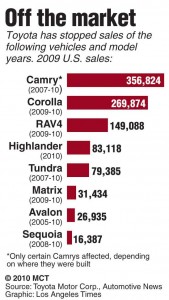Automobile manufacturers are constantly trying to differentiate their products from competitors through luxury, fuel efficiency and price. What lengths will they go to to achieve increased market shares? Manufacturers’ urgency to put the model with “the most” on the market first, can result in inadequate testing, reoccurring flaws, and thus major recalls. Recently, Toyota recalled over 9 million cars worldwide that had sticky gas pedals resulting in accelerations problems.
Business-ethics.com outlined “Five Critical Lessons” about the Toyota Recall. “Aggressive growth can create unmanageable risk”, “Get the facts quickly, and manage your risks aggressively”, and “Accept Responsibility” are lessons that address Toyota’s ethics cocerning the recalls. Prioritizing consumers’ safety after Toyota’s objective to overtake GM as the leading car manufacturer was unethical. Furthermore, when the recalls were initially addressed Toyota was indirect about the source of the problem, and how the car arrived on the market. Rather than blame the pedal supplier, spokesman Mike Michel said: “Our position on suppliers has always been that Toyota is responsible for the cars.” Ethics is designed to create a certain level of trust between corporations and consumers. By altering their objectives from quality to increasing profit, trust between Toyota and the consumer has been breached.

